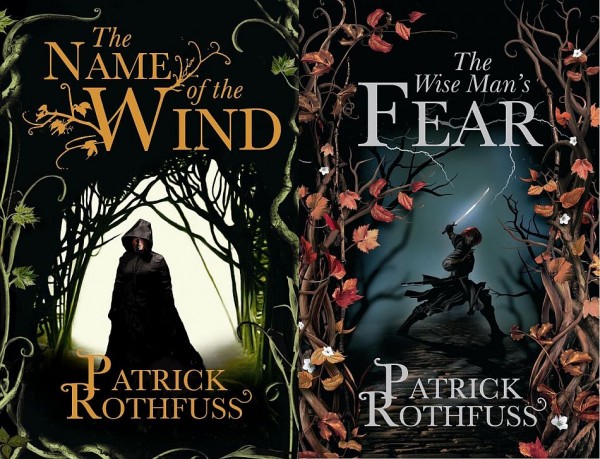
Welcome back! Just a quick note before I begin today's post: I've started work (Just finished my second week), and have a long commute, so for now I'll only be posting once a week, on Saturdays or Sundays. Once I get an apartment closer to work, I'll have more time and can post more, but until then I'll be posting weekly.
Anyway, today's post is about another one of my favorie books series: The Kingkiller Chronicle, by Patrick Rothfuss. The Kingkiller Chronicle follows the story of Kvothe, a young mage, bard, warrior, and overall legend. Each book in the trilogy (currently only two of the three have been released, in addition to a novella and a short story or two) begins and ends with Kvothe several years in the future from when the main story takes place, where he is in hiding and posing as a inkeeper in a small village. There are also interludes that go back to the inn, so the story is very much the 'story within a story' type of deal.
The writing in these books is some of the most beautiful writing I've ever seen. Rothfuss weaves together sentences that seem like poetry, except they are integral parts of wonderful epic fantasy novel. The prolouges and epilogues each consist of a a silence of three parts. These sections are wonderful prose, and I'm going to put a passage here from the last of the silences in the prologue of the first book, The Name of the Wind:
The third silence was not an easy thing to notice. If you listened for an hour, you might begin to feel it in the wooden floor underfoot and in the rough, splintering barrels behind the bar. It was in the weight of the black stone hearth that held the heat of a long dead fire. It was in the slow back and forth of a white linen cloth rubbing along the grain of the bar. And it was in the hands of the man who stood there, polishing a stretch of mahogany that already gleamed in the lamplight. The man had true-red hair, red as flame. His eyes were dark and distant, and he moved with the subtle certainty that comes from knowing many things. The Waystone was his, just as the third silence was his. This was appropriate, as it was the greatest silence of the three, wrapping the others inside itself. It was deep and wide as autumn's ending. It was heavy as a great riversmooth stone. It was the patient, cut-flower sound of a man who is waiting to die.
That passage gives me chills every time I read it, and I've read The Name of the Wind three timees.
Now, that's not to say the books are completely written in that flowery prose. There's plenty of action, dialogue, and humor - which not to say that those parts aren't beautifully written either, they're just different.
The second book in trilogy is A Wise Man's Fear, and the novella, from the perspective of an mentally ill young woman named Auri, is called The Slow Regard of Silent Things. I'd highly recommend all of these if you like epic fantasy.
Anyway, that's all for now. See you next week!
-- Bradley